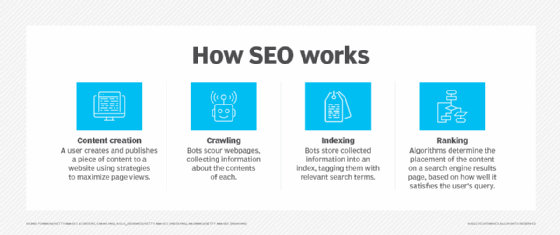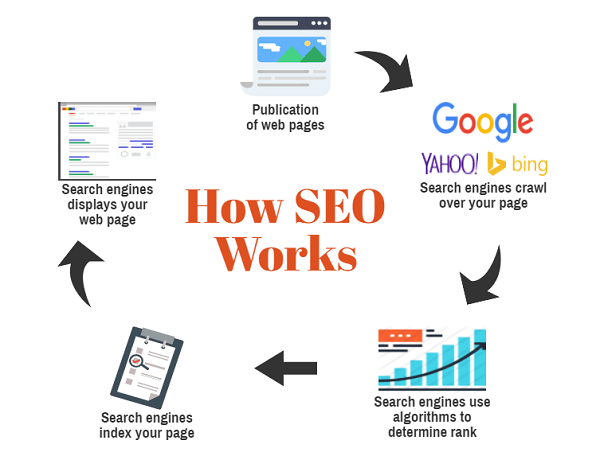What is Search Engine Optimization And How It Works: Search Engine Optimization (SEO) enhances website visibility on search engines. It involves improving content and technical aspects to rank higher.
SEO is crucial for online success. Search engines like Google use algorithms to rank pages. These algorithms consider factors like keywords, content quality, and backlinks. Optimizing these elements improves a site’s visibility in search results. Higher rankings lead to increased organic traffic.
SEO also involves on-page and off-page techniques. On-page focuses on content and HTML source code. Off-page involves external signals like backlinks. Effective SEO requires keyword research, quality content creation, and link-building strategies. Regular updates and monitoring ensure sustained performance. SEO is an ongoing process. It adapts to changes in search engine algorithms and user behavior. A well-optimized site attracts more visitors and potential customers.
How Search Engines Operate
Understanding how search engines operate is crucial for effective Search Engine Optimization (SEO). Search engines use complex algorithms to process and rank information. This involves three main processes: Crawling, Indexing, and Ranking.
Crawling
Search engines start with crawling. They use bots called spiders or crawlers. These bots scan websites to collect data. Crawlers visit pages by following links. They take note of the content, keywords, and links.
Crawling ensures search engines discover new and updated content. The goal is to find all available web pages. Crawlers follow a set of rules called the robots.txt file. This file tells them which pages to scan or ignore.
Indexing
Next is indexing. After crawling, search engines store the data. This data goes into a massive index. The index is like a giant library of web pages.
Each page’s content, keywords, and metadata get analyzed. This helps search engines understand the page’s subject. Proper indexing ensures that your content appears in relevant searches. Ensure your content is clear and keyword-rich for better indexing.
Ranking
Finally, we have ranking. Search engines rank pages based on relevance. They use complex algorithms to determine this. Factors include keyword usage, content quality, and backlinks.
Pages with high-quality content and good SEO practices rank higher. Search engines aim to provide the best answers for user queries. Keep your content useful and engaging to improve your ranking.

Credit: www.semrush.com
On-page Seo
On-Page SEO is crucial for improving your website’s visibility on search engines. It focuses on optimizing individual web pages to rank higher and earn more relevant traffic. This involves various strategies, including keyword research, content optimization, and meta tags.
Keyword Research
Keyword research is the foundation of on-page SEO. It involves identifying the terms and phrases that users type into search engines. Using these keywords strategically can help your page rank higher.
Here are some steps for effective keyword research:
- Use tools like Google Keyword Planner and Ahrefs.
- Find keywords with high search volume and low competition.
- Include long-tail keywords for specific queries.
Content Optimization
Content optimization ensures your website content is relevant and valuable. This helps search engines understand the context and relevance of your page.
Here are some tips for optimizing your content:
- Use primary keywords in headings and subheadings.
- Write high-quality, original content.
- Include multimedia elements like images and videos.
- Ensure your content is easy to read and informative.
Meta Tags
Meta tags are snippets of text that describe a page’s content. They help search engines understand the page’s topic and relevance.
Key meta tags include:
| Meta Tag | Description |
|---|---|
| Title Tag | The title of your page. Should include primary keywords. |
| Meta Description | A brief summary of the page content. Should be compelling and include keywords. |
| Header Tags | Organize your content with H1, H2, H3 tags. |
Proper use of meta tags can significantly improve your on-page SEO.
Off-page Seo
Off-Page SEO focuses on improving your website’s authority and reputation. It involves actions taken outside your website. These actions boost your site’s ranking on search engines. Let’s explore three key components of Off-Page SEO.
Backlinks
Backlinks are links from other websites to yours. They act as votes of confidence. Search engines view these links as endorsements. High-quality backlinks from reputable sites improve your ranking. Here are some ways to get backlinks:
- Write engaging content others want to share.
- Reach out to industry influencers for mentions.
- Participate in forums and online communities.
Social Signals
Social signals refer to your content’s engagement on social media. Likes, shares, and comments are examples. Strong social signals indicate your content is valuable. This can positively impact your search rankings. To enhance social signals:
- Share your content on various social media platforms.
- Encourage your audience to engage with your posts.
- Use eye-catching images and hashtags to increase visibility.
Guest Blogging
Guest blogging involves writing articles for other websites. This helps you reach new audiences. It also provides valuable backlinks to your site. Follow these steps for effective guest blogging:
- Identify websites in your niche accepting guest posts.
- Pitch unique and relevant topics to these websites.
- Write high-quality, informative articles.
- Include a link back to your site in your author bio.
Technical Seo
Technical SEO is a crucial part of optimizing your website for search engines. It focuses on improving the technical aspects to enhance visibility and performance. This ensures search engines can crawl and index your site efficiently.
Site Speed
Site speed is vital for both user experience and search rankings. A fast-loading site keeps users engaged and reduces bounce rates. To optimize site speed, consider the following:
- Compress images using tools like TinyPNG.
- Minify CSS, JavaScript, and HTML files.
- Enable browser caching to store static files locally.
- Use a Content Delivery Network (CDN) for faster global access.
Mobile Friendliness
Mobile friendliness is essential as more users access the web via mobile devices. A mobile-friendly site ensures a seamless experience across all devices. Here are some tips to enhance mobile friendliness:
- Use a responsive design that adapts to different screen sizes.
- Ensure touch elements are appropriately spaced.
- Optimize fonts for readability on smaller screens.
- Test your site using Google’s Mobile-Friendly Test tool.
Structured Data
Structured data helps search engines understand your content better. It uses specific schemas to provide detailed information about your site. Implementing structured data can improve your visibility in search results.
Here’s how to use structured data effectively:
- Identify the appropriate schema for your content (e.g., Article, Product).
- Use Google’s Structured Data Markup Helper to generate the code.
- Insert the structured data code into your HTML.
- Validate the implementation using Google’s Structured Data Testing Tool.
Seo Tools And Resources
Search Engine Optimization (SEO) can be complex. SEO tools and resources make the process easier. They help track, analyze, and improve your website’s performance. These tools offer valuable insights for better decision-making.
Analytics Tools
Analytics tools provide data about your website’s traffic and user behavior. They help you understand how visitors interact with your site. Here are some popular options:
- Google Analytics: Tracks website traffic and user activity.
- SEMrush: Offers SEO analysis and competitor insights.
- Ahrefs: Provides backlink analysis and keyword research.
Use these tools to make data-driven decisions. Improve your site’s performance based on real user data.
Keyword Tools
Keyword tools help you find the best keywords for your content. They show search volume, competition, and trends. Some popular keyword tools include:
- Google Keyword Planner: Offers keyword ideas and search volume data.
- Ubersuggest: Provides keyword suggestions and SEO difficulty scores.
- Keyword Tool: Generates keyword ideas for multiple platforms.
These tools help you choose the right keywords. Target keywords with high search volume and low competition.
Seo Plugins
SEO plugins enhance your website’s SEO capabilities. They make optimization tasks easier. Some popular SEO plugins are:
- Yoast SEO: Provides on-page SEO analysis and optimization tips.
- All in One SEO Pack: Offers a comprehensive set of SEO tools.
- Rank Math: Helps with keyword optimization and SEO audits.
Install these plugins to improve your site’s SEO. They offer user-friendly interfaces and actionable insights.

Credit: www.techtarget.com
Future Of Seo
The future of SEO is rapidly evolving. New technologies and user behaviors are reshaping the landscape. Understanding these changes is crucial for staying ahead. Let’s explore three major areas shaping the future of SEO: Voice Search, AI and Machine Learning, and User Experience.
Voice Search
Voice search is becoming more popular. People use voice assistants like Siri, Alexa, and Google Assistant. Optimizing for voice search involves focusing on natural language. Use conversational keywords and phrases. This helps in capturing voice search traffic.
Consider these voice search tips:
- Use long-tail keywords.
- Provide clear and concise answers.
- Optimize for local search queries.
Ai And Machine Learning
AI and machine learning are transforming SEO. Search engines use AI to understand user intent. Algorithms like Google’s RankBrain are becoming smarter. They analyze user behavior and adjust search results accordingly.
Key points to focus on:
- Produce high-quality, relevant content.
- Monitor user engagement metrics.
- Adapt to changes in search algorithms.
User Experience
User experience (UX) is critical for SEO success. Search engines prioritize websites that offer a great user experience. This includes fast loading times, mobile-friendliness, and easy navigation. Improving UX can boost your search rankings.
Enhance user experience by:
| Action | Benefit |
|---|---|
| Optimize site speed | Improves user satisfaction |
| Ensure mobile-friendliness | Captures mobile traffic |
| Simplify navigation | Reduces bounce rate |
The future of SEO is dynamic. Staying updated with these trends can help you stay ahead. Embrace these changes to enhance your website’s visibility and performance.

Credit: nonprofitssource.com
Frequently Asked Questions
What Is Seo And How Does It Work?
SEO stands for Search Engine Optimization. It improves website visibility on search engines. SEO uses keywords, quality content, and backlinks to rank higher. Effective SEO boosts organic traffic and enhances user experience.
How To Work Seo Step By Step?
1. Conduct keyword research. 2. Optimize on-page elements like titles, meta descriptions, and headers. 3. Create high-quality, relevant content. 4. Build quality backlinks. 5. Monitor performance and adjust strategies.
What Is Search Engine Optimization With Example?
Search engine optimization (SEO) improves a website’s visibility on search engines. For example, using relevant keywords boosts ranking.
What Is The Main Purpose Of Search Engine Optimization?
The main purpose of search engine optimization is to improve a website’s visibility on search engines. Higher visibility leads to increased organic traffic. SEO helps websites rank better in search results, making them more accessible to users. This enhances user experience and drives business growth.
What Is Search Engine Optimization?
Search Engine Optimization (SEO) improves website visibility on search engines through various strategies and techniques.
Conclusion
Understanding SEO is crucial for online success. It improves website visibility and attracts more organic traffic. Implementing effective SEO strategies can lead to higher search engine rankings. Stay updated with SEO trends to maintain a competitive edge. Start optimizing today to boost your online presence and achieve your business goals.


